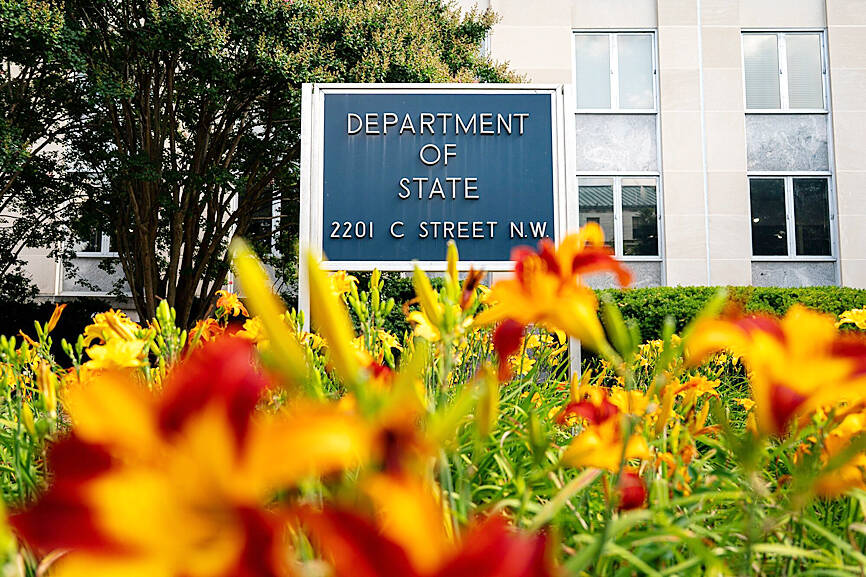The US Department of State has reaffirmed Washington’s commitment to the US-Japan alliance and to maintaining stability in the Taiwan Strait, following several economic reprisals by Beijing against Tokyo for its support of Taiwan.
US Department of State deputy spokesperson Tommy Pigott on Thursday wrote on X that the US remains unwavering in its support for Japan’s defense, calling the alliance “the cornerstone of peace and security in the Indo-Pacific.”
“We firmly oppose any unilateral attempts to change the ‘status quo,’ including through force or coercion, in the Taiwan Strait, East China Sea or South China Sea,” Pigott said.

Photo: Bloomberg
His remarks were the first proactive reaction by the state department to China’s condemnation of Japanese Prime Minister Sanae Takaichi’s comment on Nov. 7 that a Chinese attack on Taiwan could constitute “a situation threatening Japan’s survival,” which could trigger the deployment of Tokyo’s military.
Since then, China has imposed a series of measures aimed at Japan’s economy, including advisories against travel and study in the country, and the suspension of imports of Japanese seafood.
Taiwanese media over the past week twice asked the US Department of State for comment, but it did not mention the US-Japan alliance or Japan’s defense.
The US reiterated that it opposes unilateral attempts to change the “status quo,” supports cross-strait dialogue, and that differences must be resolved peacefully in a manner acceptable to people on both sides of the Strait, free from coercion.
Takaichi is the first Japanese leader in decades to publicly suggest that a Taiwan Strait crisis could lead to Japan’s military involvement.
The Inter-Parliamentary Alliance on China (IPAC) yesterday also posted on X a statement in support of Japan while condemning China.
IPAC members “strongly condemn the threatening remarks by China’s Consul-General in Osaka towards Prime Minister Takaichi. Such violet rhetoric is wholly unacceptable, reflective of the steep deterioration in Beijing’s respect for diplomatic norms repeated all over the while in recent years,” it said.
“We emphasize that Prime Minister Takaichi was entirely justified in calling attention to the broad risks of Taiwan Strait escalation,” the IPAC statement said. “Takaichi’s warning about a ‘survival-threatening situation’ reflects careful strategic thinking, not provocation, mirroring growing global recognition that Taiwanese security is global security.”
“Failure to deter and deescalate would plunge the world into an economic depression,” it added.
IPAC said it agreed with the G7 reiterating an appeal against any unilateral change to the “status quo” in the Taiwan Strait, adding that it was time to take action.
“We call upon our governments publicly to support Japan to clarify real-lines around Taiwan, and to coordinate a package of meaningful political and economic measures to deter conflict,” it said. “The people of Taiwan must be free to determine their own future, and activity which threatens global prosperity must be contained."

CROSS-STRAIT COLLABORATION: The new KMT chairwoman expressed interest in meeting the Chinese president from the start, but she’ll have to pay to get in Beijing allegedly agreed to let Chinese Nationalist Party (KMT) Chairwoman Cheng Li-wun (鄭麗文) meet with Chinese President Xi Jinping (習近平) around the Lunar New Year holiday next year on three conditions, including that the KMT block Taiwan’s arms purchases, a source said yesterday. Cheng has expressed interest in meeting Xi since she won the KMT’s chairmanship election in October. A source, speaking on condition of anonymity, said a consensus on a meeting was allegedly reached after two KMT vice chairmen visited China’s Taiwan Affairs Office Director Song Tao (宋濤) in China last month. Beijing allegedly gave the KMT three conditions it had to

STAYING ALERT: China this week deployed its largest maritime show of force to date in the region, prompting concern in Taipei and Tokyo, which Beijing has brushed off Deterring conflict over Taiwan is a priority, the White House said in its National Security Strategy published yesterday, which also called on Japan and South Korea to increase their defense spending to help protect the first island chain. Taiwan is strategically positioned between Northeast and Southeast Asia, and provides direct access to the second island chain, with one-third of global shipping passing through the South China Sea, the report said. Given the implications for the US economy, along with Taiwan’s dominance in semiconductors, “deterring a conflict over Taiwan, ideally by preserving military overmatch, is a priority,” it said. However, the strategy also reiterated

‘BALANCE OF POWER’: Hegseth said that the US did not want to ‘strangle’ China, but to ensure that none of Washington’s allies would be vulnerable to military aggression Washington has no intention of changing the “status quo” in the Taiwan Strait, US Secretary of Defense Pete Hegseth said on Saturday, adding that one of the US military’s main priorities is to deter China “through strength, not through confrontation.” Speaking at the annual Reagan National Defense Forum in Simi Valley, California, Hegseth outlined the US Department of Defense’s priorities under US President Donald Trump. “First, defending the US homeland and our hemisphere. Second, deterring China through strength, not confrontation. Third, increased burden sharing for us, allies and partners. And fourth, supercharging the US defense industrial base,” he said. US-China relations under

The Chien Feng IV (勁蜂, Mighty Hornet) loitering munition is on track to enter flight tests next month in connection with potential adoption by Taiwanese and US armed forces, a government source said yesterday. The kamikaze drone, which boasts a range of 1,000km, debuted at the Taipei Aerospace and Defense Technology Exhibition in September, the official said on condition of anonymity. The Chungshan Institute of Science and Technology and US-based Kratos Defense jointly developed the platform by leveraging the engine and airframe of the latter’s MQM-178 Firejet target drone, they said. The uncrewed aerial vehicle is designed to utilize an artificial intelligence computer